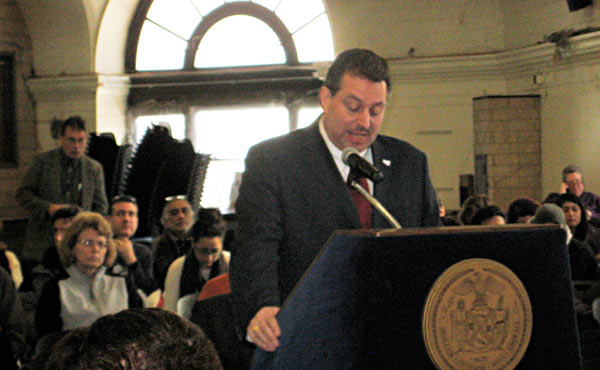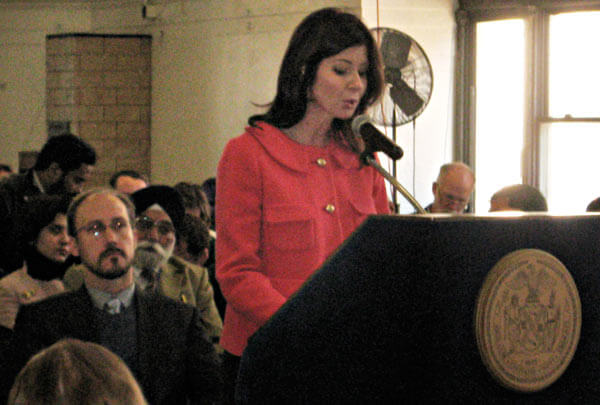By Sarina Trangle
State Assemblyman Andrew Hevesi (D-Forest Hills) responded to the city’s decision to push for a controversial homeless shelter in Glendale by chastising the city Department of Homeless Services for failing to stem the need for such facilities.
Hevesi said data showing that the economic crisis has stranded more families in shelters for longer periods of time suggests that DHS’s approach would lead to another dead end for the 125 families it proposes putting in a temporary housing facility, at 78-16 Cooper Ave.
“DHS by its own admission has been unsuccessful in fulfilling one of its core missions,” Hevesi said of the department’s goal to move families into permanent housing. “It does not stand that just continually to add facilities, as DHS is proposing in this case, will automatically decrease the length of stay for families in need.”
The assemblyman was among a dozen people who testified against Samaritan Village’s bid to create and run a 125-family homeless shelter for five years during the mayor’s Office of Contract Service hearing in Manhattan Dec. 12. Agencies are required to hold such a forum to solicit public feedback on contracts of $100,000 or more.
A preliminary draft of the contract notes that Samaritan Village must maintain a 95 percent occupancy rate and fill vacated rooms within 24 hours. DHS would pay Samaritan Village up to $115.33 daily per occupied room.
Elected officials and neighbors railed against the city’s plan to spend up to $27.5 million, transforming a vacant sewing mill and airplane part manufacturing factory into a shelter and operating it for five years. They argued that putting money into a residential building closer to subway lines, service providers and jobs would be a wiser investment. The Cooper Avenue building is about 1.3 miles from the M train.
Others had more personal concerns. Katharina Voudouris said the shelter would drag down the quality of life in Glendale.
“I work very long hours and very hard to afford a home in Glendale,” Voudouris said. “We’re concerned about our property values.”
Mark Pearson, a member of the 104th Precinct’s Civilian Observation Patrol, said the influx of people would overwhelm a neighborhood filled with mostly one-to-two-family homes and an overcrowded school district.
“Where are these children going to go?” said Pearson, whose son has 35 students in his class. “There are already 30-plus children per class in a majority of these schools.”
Many said they were nervous that the shelter, which is about a third of a mile from IS 119, would bring sex offenders near children.
Shelters cannot legally inquire about residents’ criminal backgrounds, but Lisa Black, assistant commissioner of government and community relations for DHS, said it is rare for family shelters to house sex offenders.
About 30 registered sex offenders live within ZIP code 11385, which includes Glendale, according to the state Division of Criminal Justice Services.
Community Board 5 District Manager Gary Giordano said the board unanimously voted to oppose the shelter and was outraged that it was notified about the Dec. 12 public hearing by being carbon copied on an e-mail between the mayor’s office and DHS after business hours Dec. 6.
Black said Samaritan Village, a Health and Human Services organization based in Briarwood, attempted to discuss its plans with the community board by faxing a letter to the organization in August.
DHS said many of the community’s concerns were premature because the department would treat the $27.5 million as the cap in price negotiations with Samaritan Village. If the department and nonprofit reach an agreement, the city would invest money in studies gauging how the shelter would affect the environment and infrastructure. DHS would present the contract to the comptroller for approval if such tests show a transitional housing facility could function at that location.
“We don’t know if there is a need to remediate right now,” Black said. “If it’s as bad as they say, there is no way we would house people there.”
Steve Rockman, vice president of real estate and housing for Samaritan Village, said the shelter would enforce curfews to prevent loitering, provide van transportation to and from the subway and start a community advisory board.
“We continue to be willing to meet with the community board to hear their concerns and share the details of our proposal. We believe that Samaritan Village’s efforts to help ease the severity of homelessness can result in a productive partnership with the community,” Rockman said.
Reach reporter Sarina Trangle at 718-260-4546 or by e-mail at strangle@cnglocal.com.


































